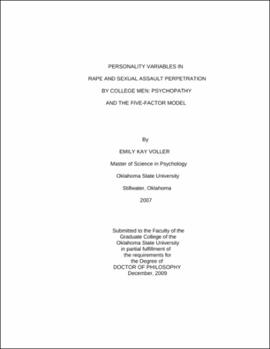| dc.contributor.advisor | Sullivan, Maureen | |
| dc.contributor.author | Voller, Emily Kay | |
| dc.date.accessioned | 2013-11-26T08:27:47Z | |
| dc.date.available | 2013-11-26T08:27:47Z | |
| dc.date.issued | 2009-12 | |
| dc.identifier.uri | https://hdl.handle.net/11244/6982 | |
| dc.description.abstract | Scope and Method of Study: The purpose of this study was to investigate what role psychopathy plays in rape and sexual assault perpetration by college men, and whether the Five-Factor model (FFM) of personality can explain differences between perpetrators and nonperpetrators beyond psychopathy. The aim was to examine the complex interrelationships among pathological and normal personality traits, in a typical college population, and determine if they provide additional insight into the nature of sexual aggression. Participants were 521 men recruited from a research participant pool at Oklahoma State University. Participants completed the Life Experiences Questionnaire, the NEO-Personality Inventory Revised, the Psychopathic Personality Inventory-Revised, and an expanded version of the Sexual Experiences Survey. Men were classified as having perpetrated rape or not, as well as having perpetrated sexual assault (but not rape) or not. Analyses of variance were used to test the hypothesis that perpetrators would report different psychopath would be important in predicting perpetration. | |
| dc.description.abstract | Findings and Conclusions: Consistent with hypotheses, perpetrators of rape reported greater levels of global psychopathy when compared to nonperpetrators (p = .03). However, no differences were found between sexual assault perpetrators and nonperpetrators. Rape perpetrators reported higher levels of Carefree Nonplanfulness and Coldheartedness (both p<.001) and lower levels of Stress Immunity (p=.01) when compared to nonperpetrators; no differences were found for sexual assault perpetrators. The FFM facets of depression, vulnerability, warmth, positive emotions, openness to feelings, openness to ideas, and competence accounted for an additional 18% of the variance in rape perpetration above psychopathy. Vulnerability, openness to feelings, and competence significantly predicted rape perpetration (all p < .05). However, the FFM facets collectively did not significantly predict sexual assault perpetration. Results suggest that psychopathy may play a role in rape perpetration on college campuses, but that variation in normal personality traits may be more useful in distinguishing rape perpetrators from nonperpetrators. Interestingly, results showed that the personalities of those who perpetrate sexual assault, but not rape, may not be entirely different from those who do not commit sexual offenses. | |
| dc.format | application/pdf | |
| dc.language | en_US | |
| dc.rights | Copyright is held by the author who has granted the Oklahoma State University Library the non-exclusive right to share this material in its institutional repository. Contact Digital Library Services at lib-dls@okstate.edu or 405-744-9161 for the permission policy on the use, reproduction or distribution of this material. | |
| dc.title | Personality variables in rape and sexual assault perpetration by college men: Psychopathy and the five-factor model | |
| dc.contributor.committeeMember | Long, Trish | |
| dc.contributor.committeeMember | Leffingwell, Thad | |
| dc.contributor.committeeMember | Chaney, John | |
| dc.contributor.committeeMember | Fuqua, Dale | |
| osu.filename | Voller_okstate_0664D_10531.pdf | |
| osu.accesstype | Open Access | |
| dc.type.genre | Dissertation | |
| dc.type.material | Text | |
| dc.subject.keywords | five-factor model | |
| dc.subject.keywords | perpetration | |
| dc.subject.keywords | personality | |
| dc.subject.keywords | psychopathy | |
| dc.subject.keywords | rape | |
| dc.subject.keywords | sexual assault | |
| thesis.degree.discipline | Clinical Psychology | |
| thesis.degree.grantor | Oklahoma State University | |
